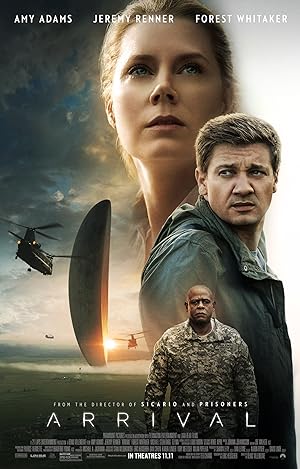Arrival is a film about aliens’ first contact on earth, and a linguist, played by Amy Adams, who is dominating the female lead in cinema, handles communication for the American delegation. There are TWELVE ships in total scattered throughout the Earth, and the way that each human delegation’s approach to communication leads either to confusion (if it is taught as a game) or a deeper understanding. Arrival also suggests that language and communication shapes our experiences and our biological selves. By learning an alien language, we are forever changed and either can be transformed to a more transcendent plane of existence or retreat in fear and suspicion.
If Denis Villeneuve directs a movie, see it. Once I realized that Villeneuve directed Arrival, I rushed to theaters to see it before it left and did not dismiss it as another pseudo intellectual exercise like Interstellar, which I hated. I was impressed by and regretted not seeing Prisoners in theaters and resolved never to make that mistake again. All his movies are in my various queues and will be seen, God willing, before the end of 2017. Villeneuve does to films what Joss Whedon does for television intentionally or not-adds a spiritual dimension to well-known genres that makes them resonate for me like a perfectly timed sermon. I wish that I had more time to see Arrival again because I suspect it is even better after repeat viewings.
Because I watch a lot of films, I actually could see the twist coming from the opening scenes of Arrival. Also as a Christian, I was prepared, maybe even groomed, to welcome such concepts since my faith deals with thorny issues such as predestination and free will. I saw the Biblical imagery in Arrival, which is blessedly not fundamentalist or exclusionary based, but similar to a Star Trek theology of existence being neither male nor female, Greek or Jew, alien or human, but a communion of the saints with God, not bound by time, place or language.
I also feel fortunate that I have enough of a memory and experience of American ideals as embodied by our early promotion of the UN and led by academia versus the conspiracy, fear-motivated violence of more ignorant, but equally dominant factions to appreciate Arrival’s depiction of our nation’s response to first contact. How long will it be before we more resemble the Chinese or Russian delegation in Arrival rather than our own? Not long.
I watched Arrival right after Jackie. Arrival poses the same central question that Jackie does: looking back, would you do it all again? Was it worth it? I know that Abbott and Costello would answer in the same way as John 15:13, “Greater love has no one than this: to lay down one’s lie for one’s friends.” Arrival demands that it is better to love and die and improve our understanding of life and each other, than to live a life of fear and die by the sword separate and alone. How will you live your life? The freedom of mortality is the hope that your deeds will live on through the opportunities that you give others. Faith without works is dead.
How will your country act? 1 Corinthians 13:1 says, “If I could speak all the languages of earth and of angels, but didn’t love others, I would only be a noisy gong or clanging cymbal.” Work without love is war. Arrival demands that as human beings and nations, we must face our mortality, become naked, unashamed and fearless and draw closer together instead of living in isolation clothed by fear, distrust and suspicion. Life is not a game.
Stay In The Know
Join my mailing list to get updates about recent reviews, upcoming speaking engagements, and film news.





